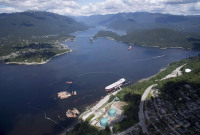Support strong Canadian climate journalism for 2025
About 100 members of a First Nation community in northern British Columbia were evacuated from their homes Tuesday evening after a gas pipeline ruptured, sparking a massive blaze.
The rupture happened on a natural gas transmission pipeline owned and operated by Enbridge about 13.5 kilometres from Prince George on Tuesday evening, Enbridge spokesman Michael Barnes said in an emailed statement.
It ignited at the site, which is in a rural area. There are no reports of injuries, he said.
"Enbridge emergency crews have responded, have isolated and are currently depressurizing two natural gas transmission lines in the vicinity to contain the incident," he said. "The incident area has been cordoned off to maintain public safety."
The evacuees largely belonged to the nearby Lheidli T'enneh First Nation and were asked to leave their homes as a precaution, he said.
"Enbridge is working with area communities to ensure public safety," he said.
British Columbia's Ministry of Environment said it had been notified of the incident Shelley, B.C., and involved an 900 PSI pipeline.
Prince George resident Dhruv Desai said he was driving up a hill toward the nearby University of Northern British Columbia when he noticed several cars had pulled off the road taking photos of something.
He pulled over as well and snapped his own shots of a massive blaze.
"I was able to see it very clearly from the hill," he said. "It was huge even from this distance."
Meanwhile, National Energy Board spokesman Tom Neufeld said the fire was along Enbridge's Westcoast main line, which falls under the board's jurisdiction.
The Westcoast Transmission System transports natural gas produced in the Western Canadian Sedimentary Basin to consumers in B.C. and, through interconnecting pipelines, other Canadian provinces and the United States.
"NEB inspectors have been deployed to this area. They're going to monitor and oversee the company's response to the incident, and they're going to determine the impact and extend of the fire and release," Neufeld said.
The NEB has also activated its emergency operations centre in Calgary, he said.
It will work closely with the Transportation Safety Board, which is responsible for investigating the incident, Neufeld said.





Comments
The incidences of fossil fuel transport failures, trains, pipelines, ships suggest that in its relatively short industrial history, the petrol/natural gas/dilbit producers either have not been able to provide or maintain equipment fit for purpose in the long haul, or nobody has taken a hard look at the deleterious effects of the petro products on the infrastructure. Perhaps their scientists have not been instructed to investigate or produce such things -probably because it will be too costly and cut into profits,
A non fossil fuel example from the nuclear energy sector has been the excessive degradation and failure of items like the rod casings in the reactors -causing disruptions in power production and cost overruns that further call into question the economics of nuclear power.
Is it the second law of thermodynamics? Is it actually possible to produce energy at a cost modern economies are willing to pay? Would the fossil fuel and nuclear energy sectors exist without massive subsidies from the public purse? Fossil fuel in particular has almost never reckoned or publicised the actual costs, including the collateral damage inflicted on people and the planet during the current production of energy from non renewable sources.